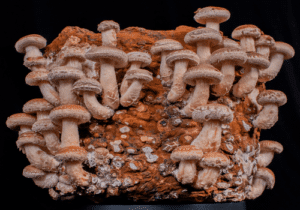
SHIITAKE: Grow Kit Instructions
Learn how to grow Shiitake mushrooms using the Myterra Labs
RECEIVE 10% OFF ON YOUR FIRST ORDER! – USE CODE: WELCOME10
Mushrooms have long captured the human imagination with their unique shapes, colors, and flavors. These fascinating fungi have been an integral part of human culture for centuries, serving as both a source of food and medicinal properties. In this comprehensive article, we will delve into the captivating world of mushrooms, exploring their diverse species, nutritional benefits, culinary uses, and the intriguing role they play in our ecosystems. So, let’s embark on this journey to discover the wonders of mushrooms!
Mushrooms are a type of fungus that belong to the kingdom Fungi. While they may appear to be similar to plants, they are actually quite distinct. Unlike plants, mushrooms lack chlorophyll and cannot produce their own food through photosynthesis. Instead, they obtain nutrients by breaking down organic matter or forming mutually beneficial relationships with other organisms.
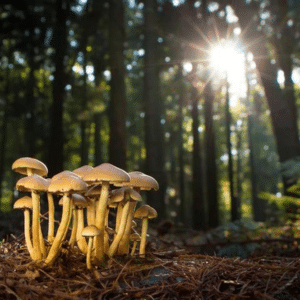
Mushrooms come in a wide array of shapes, sizes, and colors. From the familiar button mushroom found in supermarkets to the exotic morel or porcini, there are thousands of mushroom species that exist in nature. Each species possesses unique characteristics, making the world of mushrooms both captivating and diverse.
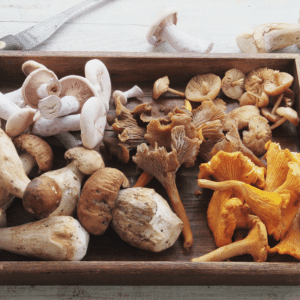
Edible mushrooms have been a staple in cuisines around the world for centuries. They add depth of flavor, texture, and nutritional value to a variety of dishes. Some popular edible mushroom varieties include:
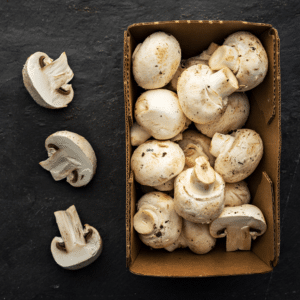
Button Mushrooms: These small, white mushrooms are commonly found in supermarkets and are a versatile ingredient in various dishes.
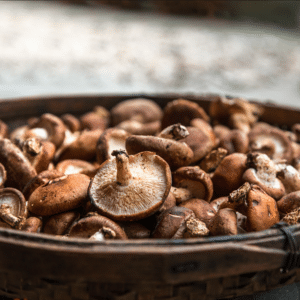
Shiitake Mushrooms: Originating from East Asia, shiitake mushrooms have a distinctive flavor and are often used in stir-fries and soups.
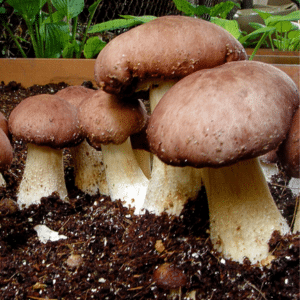
Wine Cap Mushrooms: With their large, meaty texture, wine cap mushrooms are often used as a vegetarian substitute for burgers or grilled as a standalone dish.
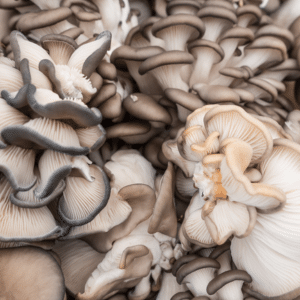
Oyster Mushrooms: These delicate mushrooms have a subtle flavor and are frequently used in Asian cuisine.
Mushrooms have also been valued for their medicinal properties for centuries. Traditional Chinese medicine and other ancient healing practices have recognized the therapeutic benefits of certain mushroom species. Some well-known medicinal mushrooms include:
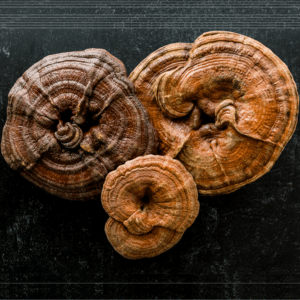
Reishi Mushrooms: Reishi mushrooms are renowned for their immune-boosting and stress-reducing properties. They are often consumed in the form of teas or supplements.
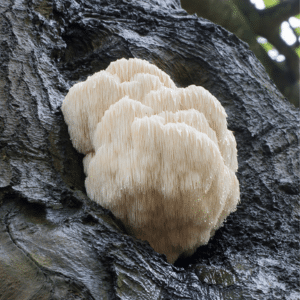
Lion’s Mane Mushrooms: Lion’s mane mushrooms are believed to enhance cognitive function and may have neuroprotective effects. They can be enjoyed sautéed or brewed into a tea.
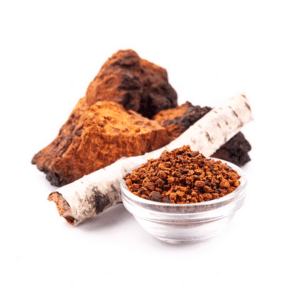
Chaga Mushrooms: Chaga mushrooms are rich in antioxidants and have been used to support immune health. They are typically consumed as a tea or in powdered form. Chaga cannot be grown at home or commercially and is harvested from nature.
Mushrooms are not only flavorful but also pack a nutritional punch. They are low in calories, fat-free, and provide a range of essential nutrients. Here are some key nutritional benefits of mushrooms:
Mushrooms are an excellent source of various vitamins and minerals, including:
– Vitamin D: Some mushrooms, particularly those exposed to sunlight, can naturally produce vitamin D, which is important for bone health and immune function.
– B Vitamins: Mushrooms are a good source of B vitamins, including riboflavin, niacin, and pantothenic acid, which play a crucial role in energy metabolism.
– Selenium: Mushrooms are one of the few plant-based sources of selenium, a mineral that acts as an antioxidant and supports thyroid function.
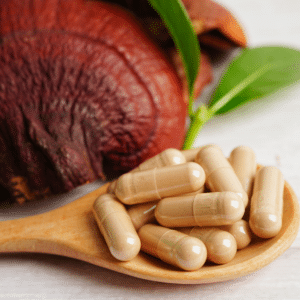
Mushrooms contain antioxidants that help combat oxidative stress and reduce the risk of chronic diseases. These antioxidants, such as ergothioneine and glutathione, protect cells from damage caused by free radicals.
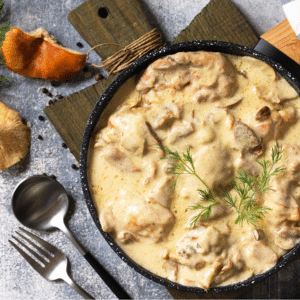
Mushrooms are highly versatile in the kitchen and can be incorporated into a wide range of dishes. Whether used as a main ingredient or as a flavor-enhancing addition, mushrooms add depth and complexity to culinary creations. Here are some popular culinary uses of mushrooms:
Mushrooms are often sautéed or stir-fried to bring out their flavors and create a delicious base for various dishes. Their unique textures and earthy flavors complement a variety of vegetables, meats, and sauces.
Mushrooms make a wonderful addition to soups and stews, adding depth and richness to the broth. They can be sliced, diced, or left whole, depending on the desired texture and presentation.
Mushrooms are a classic topping for pizzas, lending their umami flavor to the dish. Whether used alone or in combination with other ingredients, mushrooms add a savory element to every bite.
The hollow caps of larger mushrooms, such as portobellos, make them perfect for stuffing with various fillings. From cheese and breadcrumbs to seasoned meats or vegetables, stuffed mushrooms are a crowd-pleasing appetizer or main course.
Mushrooms play a crucial role in maintaining the balance of ecosystems. They form symbiotic relationships with plants, trees, and other organisms, contributing to nutrient cycling and soil health. Here are some key roles mushrooms play in ecosystems:
Mushrooms are nature’s decomposers, breaking down organic matter and releasing nutrients back into the soil. They help recycle nutrients from dead plants and animals, enriching the soil and supporting the growth of new life.
Many mushrooms form mutualistic relationships with plants, known as mycorrhizal associations. In these partnerships, the mushrooms help the plant absorb nutrients from the soil, while the plant provides sugars and carbohydrates to the mushrooms through photosynthesis.
Certain mushrooms act as indicators of the overall health of an ecosystem. Their presence or absence can provide insights into the environmental conditions, such as soil fertility or pollution levels.
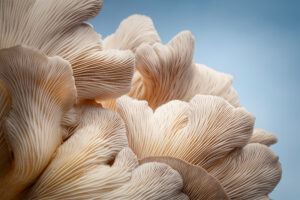
Not all mushrooms are safe for consumption. Some wild mushrooms can be toxic or even deadly. It is essential to have proper knowledge and expertise or consult an expert mycologist before consuming wild mushrooms.
Yes, mushrooms can be grown at home using kits or by creating the right growing conditions. Many mushroom varieties, such as oyster mushrooms, can be easily cultivated indoors. The easiest way to grow gourmet mushrooms and learn more about mushroom cultivation is by growing mushrooms using Myterra Labs’ gourmet grow kit:
Mushrooms, with their meaty texture and umami flavor, are often used as a vegetarian substitute for meat in various dishes. Portobello mushrooms, for example, can be grilled and used as a burger patty alternative, Lion’s mane make delicious steaks, and pink oysters make delicious vegan bacon.
Certain mushrooms, such as reishi and shiitake mushrooms, have been traditionally believed to have immune-boosting properties. While more research is needed, these mushrooms may have potential benefits for immune health.
Fresh mushrooms should be stored in a paper bag or a loosely closed container in the refrigerator. Avoid storing them in plastic bags, as they can become slimy. Dried mushrooms can be stored in a cool, dry place for an extended period.
Yes, certain mushroom species can be used to create natural dyes for fabrics and yarns. For example, the parasol mushroom can produce a beautiful golden dye, while the dyer’s polypore can yield shades of brown.
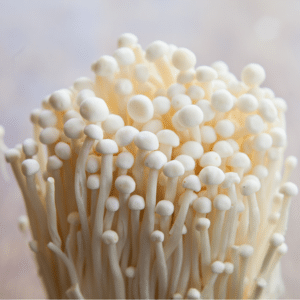
Mushrooms are truly nature’s hidden gems, offering a world of culinary delights, medicinal benefits, and ecological importance. From their diverse species and nutritional benefits to their myriad of culinary uses, mushrooms continue to captivate and inspire. So, the next time you come across a mushroom, take a moment to appreciate the wonders of this fascinating fungi and consider incorporating them into your meals or exploring their therapeutic potential. Let mushrooms add a touch of magic to your life!
If you enjoyed this article and want to share with the rest of the world, click on one of the links below to spread the amazing story about fungi!
Mushrooms have long captured the human imagination with their unique shapes, colors, and flavors. These fascinating fungi have been an integral part of human culture for centuries, serving as both a source of food and medicinal properties. In this comprehensive article, we will delve into the captivating world of mushrooms, exploring their diverse species, nutritional benefits, culinary uses, and the intriguing role they play in our ecosystems. So, let’s embark on this journey to discover the wonders of mushrooms!
Mushrooms are a type of fungus that belong to the kingdom Fungi. While they may appear to be similar to plants, they are actually quite distinct. Unlike plants, mushrooms lack chlorophyll and cannot produce their own food through photosynthesis. Instead, they obtain nutrients by breaking down organic matter or forming mutually beneficial relationships with other organisms.

Mushrooms come in a wide array of shapes, sizes, and colors. From the familiar button mushroom found in supermarkets to the exotic morel or porcini, there are thousands of mushroom species that exist in nature. Each species possesses unique characteristics, making the world of mushrooms both captivating and diverse.

Edible mushrooms have been a staple in cuisines around the world for centuries. They add depth of flavor, texture, and nutritional value to a variety of dishes. Some popular edible mushroom varieties include:

Button Mushrooms: These small, white mushrooms are commonly found in supermarkets and are a versatile ingredient in various dishes.

Shiitake Mushrooms: Originating from East Asia, shiitake mushrooms have a distinctive flavor and are often used in stir-fries and soups.

Wine Cap Mushrooms: With their large, meaty texture, wine cap mushrooms are often used as a vegetarian substitute for burgers or grilled as a standalone dish.

Oyster Mushrooms: These delicate mushrooms have a subtle flavor and are frequently used in Asian cuisine.
Mushrooms have also been valued for their medicinal properties for centuries. Traditional Chinese medicine and other ancient healing practices have recognized the therapeutic benefits of certain mushroom species. Some well-known medicinal mushrooms include:

Reishi Mushrooms: Reishi mushrooms are renowned for their immune-boosting and stress-reducing properties. They are often consumed in the form of teas or supplements.

Lion’s Mane Mushrooms: Lion’s mane mushrooms are believed to enhance cognitive function and may have neuroprotective effects. They can be enjoyed sautéed or brewed into a tea.

Chaga Mushrooms: Chaga mushrooms are rich in antioxidants and have been used to support immune health. They are typically consumed as a tea or in powdered form. Chaga cannot be grown at home or commercially and is harvested from nature.
Mushrooms are not only flavorful but also pack a nutritional punch. They are low in calories, fat-free, and provide a range of essential nutrients. Here are some key nutritional benefits of mushrooms:
Mushrooms are an excellent source of various vitamins and minerals, including:
– Vitamin D: Some mushrooms, particularly those exposed to sunlight, can naturally produce vitamin D, which is important for bone health and immune function.
– B Vitamins: Mushrooms are a good source of B vitamins, including riboflavin, niacin, and pantothenic acid, which play a crucial role in energy metabolism.
– Selenium: Mushrooms are one of the few plant-based sources of selenium, a mineral that acts as an antioxidant and supports thyroid function.

Mushrooms contain antioxidants that help combat oxidative stress and reduce the risk of chronic diseases. These antioxidants, such as ergothioneine and glutathione, protect cells from damage caused by free radicals.

Mushrooms are highly versatile in the kitchen and can be incorporated into a wide range of dishes. Whether used as a main ingredient or as a flavor-enhancing addition, mushrooms add depth and complexity to culinary creations. Here are some popular culinary uses of mushrooms:
Mushrooms are often sautéed or stir-fried to bring out their flavors and create a delicious base for various dishes. Their unique textures and earthy flavors complement a variety of vegetables, meats, and sauces.
Mushrooms make a wonderful addition to soups and stews, adding depth and richness to the broth. They can be sliced, diced, or left whole, depending on the desired texture and presentation.
Mushrooms are a classic topping for pizzas, lending their umami flavor to the dish. Whether used alone or in combination with other ingredients, mushrooms add a savory element to every bite.
The hollow caps of larger mushrooms, such as portobellos, make them perfect for stuffing with various fillings. From cheese and breadcrumbs to seasoned meats or vegetables, stuffed mushrooms are a crowd-pleasing appetizer or main course.
Mushrooms play a crucial role in maintaining the balance of ecosystems. They form symbiotic relationships with plants, trees, and other organisms, contributing to nutrient cycling and soil health. Here are some key roles mushrooms play in ecosystems:
Mushrooms are nature’s decomposers, breaking down organic matter and releasing nutrients back into the soil. They help recycle nutrients from dead plants and animals, enriching the soil and supporting the growth of new life.
Many mushrooms form mutualistic relationships with plants, known as mycorrhizal associations. In these partnerships, the mushrooms help the plant absorb nutrients from the soil, while the plant provides sugars and carbohydrates to the mushrooms through photosynthesis.
Certain mushrooms act as indicators of the overall health of an ecosystem. Their presence or absence can provide insights into the environmental conditions, such as soil fertility or pollution levels.

Not all mushrooms are safe for consumption. Some wild mushrooms can be toxic or even deadly. It is essential to have proper knowledge and expertise or consult an expert mycologist before consuming wild mushrooms.
Yes, mushrooms can be grown at home using kits or by creating the right growing conditions. Many mushroom varieties, such as oyster mushrooms, can be easily cultivated indoors. The easiest way to grow gourmet mushrooms and learn more about mushroom cultivation is by growing mushrooms using Myterra Labs’ gourmet grow kit:
Mushrooms, with their meaty texture and umami flavor, are often used as a vegetarian substitute for meat in various dishes. Portobello mushrooms, for example, can be grilled and used as a burger patty alternative, Lion’s mane make delicious steaks, and pink oysters make delicious vegan bacon.
Certain mushrooms, such as reishi and shiitake mushrooms, have been traditionally believed to have immune-boosting properties. While more research is needed, these mushrooms may have potential benefits for immune health.
Fresh mushrooms should be stored in a paper bag or a loosely closed container in the refrigerator. Avoid storing them in plastic bags, as they can become slimy. Dried mushrooms can be stored in a cool, dry place for an extended period.
Yes, certain mushroom species can be used to create natural dyes for fabrics and yarns. For example, the parasol mushroom can produce a beautiful golden dye, while the dyer’s polypore can yield shades of brown.

Mushrooms are truly nature’s hidden gems, offering a world of culinary delights, medicinal benefits, and ecological importance. From their diverse species and nutritional benefits to their myriad of culinary uses, mushrooms continue to captivate and inspire. So, the next time you come across a mushroom, take a moment to appreciate the wonders of this fascinating fungi and consider incorporating them into your meals or exploring their therapeutic potential. Let mushrooms add a touch of magic to your life!
If you enjoyed this article and want to share with the rest of the world, click on one of the links below to spread the amazing story about fungi!

Learn how to grow Shiitake mushrooms using the Myterra Labs
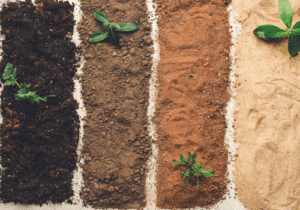
Selecting the right substrate is a key element in successful
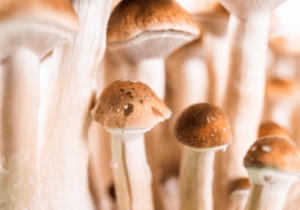
Welcome to the enchanting realm of our All-in-one Grow Kit,
© 2023 Myterra Labs. Designed by Laura Ramsay. Developed by Info2grow Media Services.